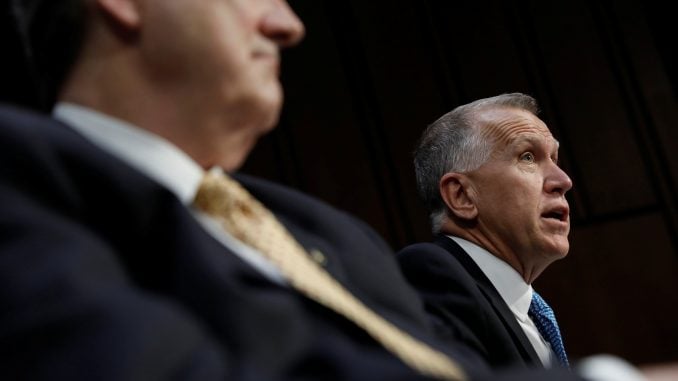
WASHINGTON, D.C. U.S. Sen. Thom Tillis (R-N.C.) introduced a bill this week that would help small businesses hire nonagricultural seasonal workers though the H-2B visa program.The Save our Small and Seasonal Businesses Act of 2017 would streamline some of the reporting requirements and includes a “returning worker exemption” provision. That allows workers who have previously worked in the U.S. through the H-2B visa program to not count against the visa cap. Congress set a cap of 66,000 workers per fiscal year with some exemptions. Immigration officials announced on March 16 that the cap was met for the entire 2017 fiscal year.”Across North Carolina and the country, seasonal employers have been unfairly facing bureaucratic barriers through the H-2B program, to the point where they are not even sure if they can continue to stay in business,” said Tillis. “This bipartisan legislation will not only help alleviate the stress and frustrations our business owners face within the H-2B program, but will continue to place a priority on both the American workforce and our local economies.”Under the H-2B law, employers are required to try to hire American workers first for open positions, but often for nonagricultural seasonal work there are not enough candidates. According to Joe Stewart, executive director of the N.C. Free Enterprise Foundation, the H-2B visas help small businesses fill in their workforce gaps.”With such a significant presence of high-tech, life science, and resort travel and tourism types of employment opportunities in North Carolina, the challenge employers often face is the workers they need for those jobs are simply not available,” said Stewart. “The visa program requires quite stringent effort be made to identify an American prospect for those jobs, so it’s not as though expanding the visa program displaces American workers. Quite frankly, having those positions filled and the spinoff into the economy locally probably helps employ other Americans in related industries.”The bill does not apply to the H-2A guest worker program, which is a visa program for farm laborers. The North Carolina Growers Association (NCGA) is the nation’s largest user of the H-2A guest worker program. Both are temporary worker programs. Stewart said the controversy around illegal immigration is clouding needed conversation about guest worker visas.”The thing that employers always say frustrates them about this issue is that it is being overshadowed by other immigration issues, is that anything relative to employment visas is highly scrutinized and relatively significant for the employer,” said Stewart. “There are screening, all types of reporting requirements, so an employer in need of a particular type of employee is not entering into a visa relationship lightly.”This gets swept up into the issue of people coming into the country illegally. … This is completely separate from that but employers say it can’t be dealt with as an issue because of the politicization of other aspects of immigration in the country.”The measure, S. 792, was introduced in the Senate Judiciary Committee late last week and has not been debated by lawmakers yet.



